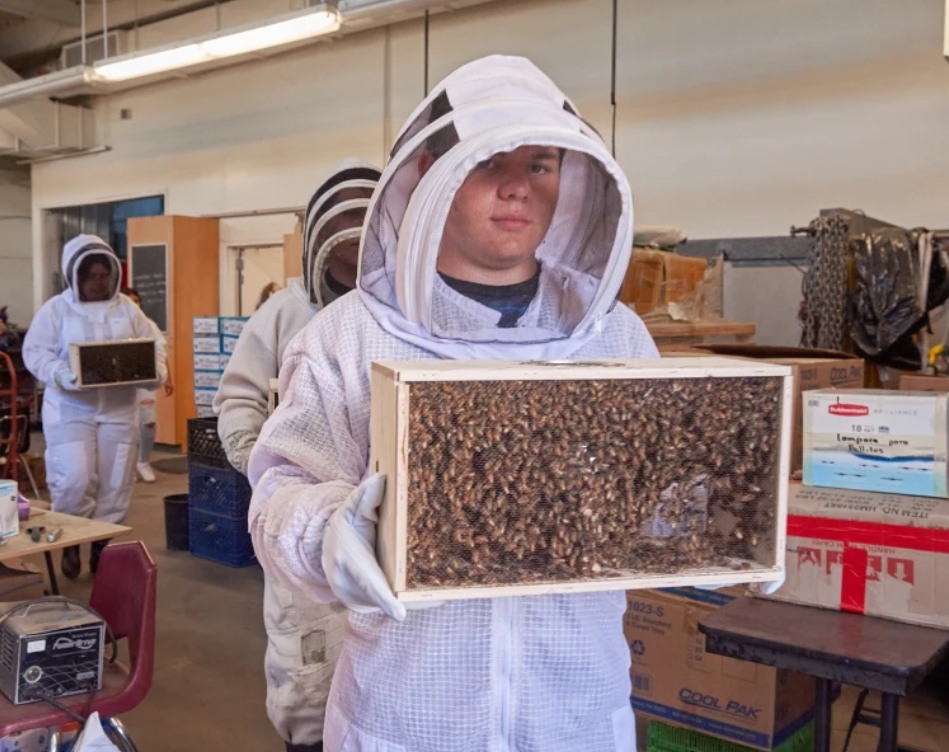
By Grace Toohey
Mayra Bahena had always been told to try to stay away from bees.
But then the Westminster High junior found herself head-to-toe in a white beekeeping suit, accepting thousands of bees on behalf of her high school’s new agriculture program addition.
“To willingly hold bees and be around them is so ironic and funny,” Bahena said. “I’ve never ever held that many bees in my life – it was something so new and exciting.”
Bahena is one of about 15 students helping establish California’s first high school beekeeping program, hoping to create a sanctuary at Westminster High for six queen bees and 60,000 worker bees to live, work and eventually produce honey, beeswax and other hive by-products.
“I was all in, it’s something so different,” said Bahena, who is a leader in the school’s FFA program, a student organization focused on leadership and career opportunities through agriculture education. “I know this is going to bring a lot of color and uniqueness to our school.”
Through a partnership with the Community Action Partnership of Orange County and with startup funds from the USDA, Westminster High accepted the bees from local company Honey Pacifica, beginning the months-long process of caring for the bees, harvesting their honey and making marketable products.
While the high school already has an expansive agricultural program – including its 8-acre Giving Farm on which students grow donations for local food pantries, as well as projects to raise livestock and operate farming machinery – the beekeeping program will further enhance students’ educational opportunities and hands-on experiences, agriculture instructor Dave Eusantos said.
“These are city kids, and some of them they see bees, but they don’t give them a second thought and what that creature means to their food supply,” Eusantos said. “Learning about bees is so very fascinating, it’s a fantastic way to teach so many areas of agriculture science.”
Eusantos said he’s leaning heavily on the support and wisdom of Honey Pacifica owner Jon Poto to help jump-start the program. The program already has plans to grow a pollinator garden for the bees, and is working with other programs for studying marketing and culinary arts to help advertise and sell the students’ soon-to-be honey products.
Eusantos and Poto said they expect the school’s first batch of honey could be harvested by August or September.
Poto said his company’s involvement in the workforce development program at the high school is special because Honey Pacifica’s origins can be traced to his brother Frank’s high-school science project involving bees.
“This was the catalyst for our family’s journey into beekeeping,” he said. “We’re so excited to work with Westminster High School’s passionate students to bring this working bee colony to life, which we’re hoping will lead to a profitable honey endeavor.”
Community Action Partnership officials said they hope the program at Westminster High can become a model for other schools in the region, especially as projections show that income from the bee products should offset most costs to run the program, with volunteers and students providing the necessary workforce.
“These students have worked diligently to provide this colony of bees a safe home here at our Giving Farm and we’re confident they will take great care of them and produce quality, organic honey that locals will love,” Westminster High Principal Amy Sabol said.
While Eusantos said he understands not all the students in his agriculture classes or the FFA program are interested in pursuing careers in agriculture – Bahena hopes to study liberal arts in college – he knows the coursework and experiences are still so valuable. He said he’s focused on helping the teens better understand how they interact with food and materials, so they can be “responsible citizens.”
“I’m not trying to turn them into a farmer,” he said. “I’m trying to teach you about where your food and fiber comes from.
“I know the looks on the students’ faces and their body language as they were putting the bees into the beehives – it was a once in a lifetime experience,” he said. “That’s something that you can’t mimic in terms of a zoom meeting, … or YouTube video. Seeing it, hearing it, smelling it and feeling it, this hands-on, in-person experience is so valuable.”


